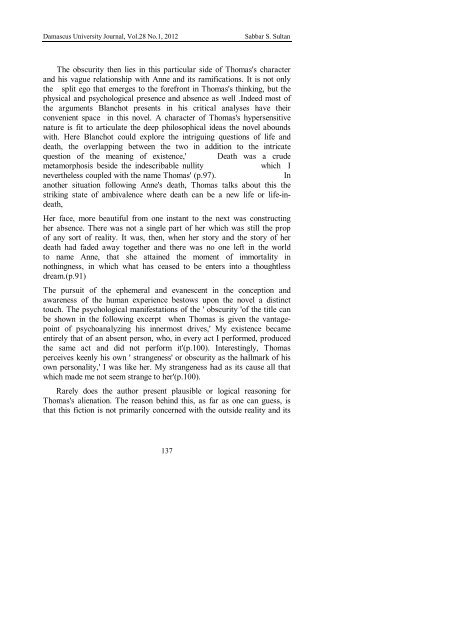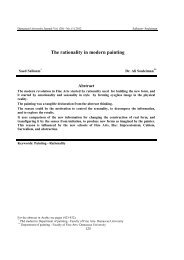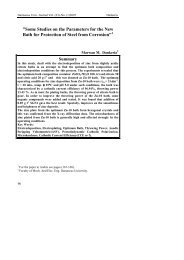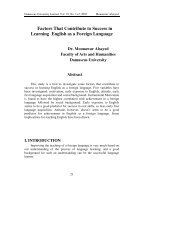<strong>Types</strong> <strong>of</strong> <strong>Obscurity</strong> <strong>in</strong> <strong>Thomas</strong> <strong>Hardy's</strong> <strong>Jude</strong> <strong>the</strong> <strong>Obscure</strong> <strong>and</strong> Maurice Blanchot's …to describe a sensation, whereas Beckett (or Blanchot) sets out fromsensations which <strong>in</strong>dicate or congeal about concept.(p.28)As already <strong>in</strong>dicated, <strong>the</strong> novel deliberately throws overboard all <strong>the</strong>conventions <strong>of</strong> <strong>the</strong> traditional fiction—time, place, plott<strong>in</strong>g, solid,characterization,...etc. If Blanchot has put an end to all <strong>the</strong>se <strong>in</strong>gredients<strong>of</strong> fiction (here he goes fur<strong>the</strong>r than what has already been d<strong>in</strong>e by <strong>the</strong>Irish James Joyce), <strong>the</strong> overall outcome is a dar<strong>in</strong>g attempt <strong>of</strong> stripp<strong>in</strong>g<strong>the</strong> narrative <strong>in</strong> <strong>the</strong> hope <strong>of</strong> excavat<strong>in</strong>g <strong>the</strong> characters' consciousness <strong>and</strong>capture what lies underneath. As he puts it <strong>in</strong> his epigraph, his primaryobjective is dar<strong>in</strong>g if not hazardous,If one is right <strong>in</strong> mak<strong>in</strong>g no dist<strong>in</strong>ction between <strong>the</strong> figure <strong>and</strong> thatwhich is, or believes itself to be, its center, whenever <strong>the</strong> completefigure itself expresses no more than <strong>the</strong> search for an <strong>in</strong>juredcenter.(Blanchot,1988,3)What sort <strong>of</strong> person or figure is this <strong>Thomas</strong>, <strong>the</strong> obscure? Theauthor willfully <strong>and</strong> wistfully shuns any relevance or contextualiz<strong>in</strong>g <strong>of</strong>his events or people. There are no specific or useful details or entries thatwould help <strong>the</strong> reader to perceive or visualize <strong>the</strong> contours <strong>of</strong> hischaracters, let alone a full <strong>and</strong> identifiable name. The book is contentwith yok<strong>in</strong>g <strong>the</strong> ma<strong>in</strong> character's presence with <strong>the</strong> epi<strong>the</strong>t 'obscure'. Isthis putative obscurity <strong>in</strong>herent <strong>in</strong> <strong>Thomas</strong>'s character or a trait imposedby those surround<strong>in</strong>g him? Such questions are hard to answer with areasonable degree <strong>of</strong> assurance. However <strong>the</strong>y bear crucial import for <strong>the</strong>ma<strong>in</strong> po<strong>in</strong>t <strong>in</strong> <strong>the</strong> novel. In general, <strong>Thomas</strong> <strong>the</strong> <strong>Obscure</strong> is marked by agreat extent <strong>of</strong> paren<strong>the</strong>ses, digressions, <strong>and</strong> free association <strong>of</strong> ideas.Such rum<strong>in</strong>ations, vertigos, self- expressions, <strong>in</strong>terlocutions epiphanies,figments <strong>of</strong> <strong>the</strong> m<strong>in</strong>d, ,ricochets, impossibilities, <strong>in</strong>vestigations,,revelations, psychic <strong>in</strong>dulgencies <strong>and</strong> above all <strong>the</strong> impossibility <strong>of</strong>speak<strong>in</strong>g or establish<strong>in</strong>g actual <strong>and</strong> fruitful contacts with o<strong>the</strong>rs. For<strong>in</strong>stance, <strong>the</strong> author <strong>in</strong>vestigates <strong>Thomas</strong>'s consciousness <strong>and</strong> probes <strong>the</strong>half-perceived dualities <strong>in</strong>form<strong>in</strong>g all his actions <strong>and</strong> perceptions,I had apart <strong>of</strong> myself submerged, <strong>and</strong> it was to this part, lost <strong>in</strong> aconstant shipwreck, that I owed my direction, my face, mynecessity.(p.97)136
Damascus University Journal, Vol.28 No.1, 2012Sabbar S. SultanThe obscurity <strong>the</strong>n lies <strong>in</strong> this particular side <strong>of</strong> <strong>Thomas</strong>'s character<strong>and</strong> his vague relationship with Anne <strong>and</strong> its ramifications. It is not only<strong>the</strong> split ego that emerges to <strong>the</strong> forefront <strong>in</strong> <strong>Thomas</strong>'s th<strong>in</strong>k<strong>in</strong>g, but <strong>the</strong>physical <strong>and</strong> psychological presence <strong>and</strong> absence as well .Indeed most <strong>of</strong><strong>the</strong> arguments Blanchot presents <strong>in</strong> his critical analyses have <strong>the</strong>irconvenient space <strong>in</strong> this novel. A character <strong>of</strong> <strong>Thomas</strong>'s hypersensitivenature is fit to articulate <strong>the</strong> deep philosophical ideas <strong>the</strong> novel aboundswith. Here Blanchot could explore <strong>the</strong> <strong>in</strong>trigu<strong>in</strong>g questions <strong>of</strong> life <strong>and</strong>death, <strong>the</strong> overlapp<strong>in</strong>g between <strong>the</strong> two <strong>in</strong> addition to <strong>the</strong> <strong>in</strong>tricatequestion <strong>of</strong> <strong>the</strong> mean<strong>in</strong>g <strong>of</strong> existence,' Death was a crudemetamorphosis beside <strong>the</strong> <strong>in</strong>describable nullitywhich Inever<strong>the</strong>less coupled with <strong>the</strong> name <strong>Thomas</strong>' (p.97).Inano<strong>the</strong>r situation follow<strong>in</strong>g Anne's death, <strong>Thomas</strong> talks about this <strong>the</strong>strik<strong>in</strong>g state <strong>of</strong> ambivalence where death can be a new life or life-<strong>in</strong>death,Her face, more beautiful from one <strong>in</strong>stant to <strong>the</strong> next was construct<strong>in</strong>gher absence. There was not a s<strong>in</strong>gle part <strong>of</strong> her which was still <strong>the</strong> prop<strong>of</strong> any sort <strong>of</strong> reality. It was, <strong>the</strong>n, when her story <strong>and</strong> <strong>the</strong> story <strong>of</strong> herdeath had faded away toge<strong>the</strong>r <strong>and</strong> <strong>the</strong>re was no one left <strong>in</strong> <strong>the</strong> worldto name Anne, that she atta<strong>in</strong>ed <strong>the</strong> moment <strong>of</strong> immortality <strong>in</strong>noth<strong>in</strong>gness, <strong>in</strong> which what has ceased to be enters <strong>in</strong>to a thoughtlessdream.(p.91)The pursuit <strong>of</strong> <strong>the</strong> ephemeral <strong>and</strong> evanescent <strong>in</strong> <strong>the</strong> conception <strong>and</strong>awareness <strong>of</strong> <strong>the</strong> human experience bestows upon <strong>the</strong> novel a dist<strong>in</strong>cttouch. The psychological manifestations <strong>of</strong> <strong>the</strong> ' obscurity '<strong>of</strong> <strong>the</strong> title canbe shown <strong>in</strong> <strong>the</strong> follow<strong>in</strong>g excerpt when <strong>Thomas</strong> is given <strong>the</strong> vantagepo<strong>in</strong>t<strong>of</strong> psychoanalyz<strong>in</strong>g his <strong>in</strong>nermost drives,' My existence becameentirely that <strong>of</strong> an absent person, who, <strong>in</strong> every act I performed, produced<strong>the</strong> same act <strong>and</strong> did not perform it'(p.100). Interest<strong>in</strong>gly, <strong>Thomas</strong>perceives keenly his own ' strangeness' or obscurity as <strong>the</strong> hallmark <strong>of</strong> hisown personality,' I was like her. My strangeness had as its cause all thatwhich made me not seem strange to her'(p.100).Rarely does <strong>the</strong> author present plausible or logical reason<strong>in</strong>g for<strong>Thomas</strong>'s alienation. The reason beh<strong>in</strong>d this, as far as one can guess, isthat this fiction is not primarily concerned with <strong>the</strong> outside reality <strong>and</strong> its137
- Page 1 and 2: Damascus University Journal, Vol.28
- Page 3 and 4: Damascus University Journal, Vol.28
- Page 5 and 6: Damascus University Journal, Vol.28
- Page 7 and 8: Damascus University Journal, Vol.28
- Page 9 and 10: Damascus University Journal, Vol.28
- Page 11 and 12: Damascus University Journal, Vol.28
- Page 13 and 14: Damascus University Journal, Vol.28
- Page 15 and 16: Damascus University Journal, Vol.28
- Page 17 and 18: Damascus University Journal, Vol.28
- Page 19 and 20: Damascus University Journal, Vol.28
- Page 21 and 22: Damascus University Journal, Vol.28
- Page 23: Damascus University Journal, Vol.28
- Page 27 and 28: Damascus University Journal, Vol.28
- Page 29 and 30: Damascus University Journal, Vol.28
- Page 31 and 32: Damascus University Journal, Vol.28
- Page 33 and 34: Damascus University Journal, Vol.28
- Page 35 and 36: Damascus University Journal, Vol.28
- Page 37 and 38: Damascus University Journal, Vol.28
















